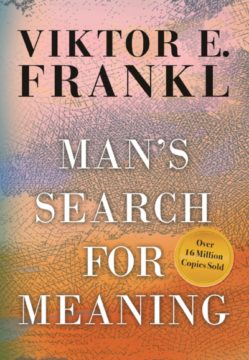by Marie Snyder
 A dear friend of mine recently passed away unexpectedly. He had recommended I read Viktor Frankl’s Man’s Search for Meaning, which I gobbled up in no time, yet it was too late to talk to him about it. That’s destroying me a bit these days, so I’m writing about it instead.
A dear friend of mine recently passed away unexpectedly. He had recommended I read Viktor Frankl’s Man’s Search for Meaning, which I gobbled up in no time, yet it was too late to talk to him about it. That’s destroying me a bit these days, so I’m writing about it instead.
Frankl survived several concentration camps, the near starvation and typhus that took many others, and explains how he coped and designed a form of psychotherapy in the process. He kept his mind on the future, imagining better days after the war, back with his wife again and lecturing about his experiences. I’ve read it trying to use his word to better tolerate the less acute, more chronic threat of Covid. It might seem trite or contrived to make such a comparison, but consider that more people have succumbed to Covid than Jewish prisoners in the camps and it continues because we are living blindly to it, unthinking. I’m hoping to learn something from his work beyond the obvious problems with allowing unfettered discrimination.
The book is in two parts. In the first, originally published in 1946, he describes his experiences living in a death camp and the three phases of survival in camp life. He wrote it after being released and returning to Vienna to learn that his pregnant wife, parents, and brother had all died in the camps. In the second half he explains how to cope with it all, but I’ll save that for next month. Page numbers throughout are from the 2006 edition. Read more »
